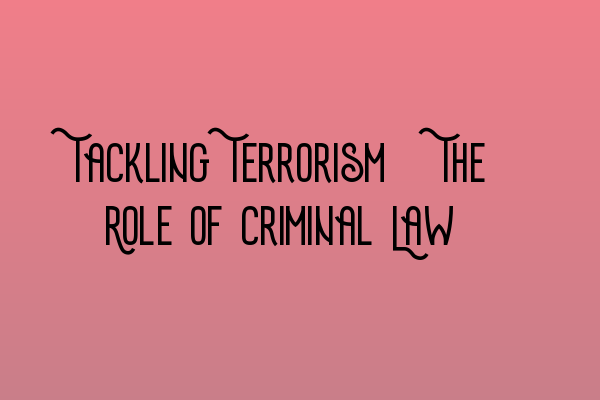TITLE: Tackling Terrorism: The Vital Role of Criminal Law in Ensuring Public Safety
Introduction:
Terrorism has emerged as a pervasive threat to global security, demanding comprehensive efforts and cooperation from governments worldwide. In the United Kingdom, the Criminal Law plays a crucial role in effectively combating terrorism and safeguarding the lives of its citizens. This blog post aims to provide a comprehensive understanding of the role that Criminal Law plays in tackling terrorism, focusing on its key principles, legal framework, and the significance of robust prosecution. Let us delve deeper into this subject to comprehend the extent of the challenges faced and the strategies employed to ensure public safety.
Keywords: tackling terrorism, Criminal Law, public safety, global security
The Legal Framework:
The UK’s Criminal Law is built upon a robust legal framework designed to tackle terrorism effectively. This framework consists of numerous statutes, including the Terrorism Act 2000 and the Counter-Terrorism Act 2008, which grant the authorities significant powers to investigate, prevent, prosecute, and disrupt terrorist activities.
Due to the complex nature and evolving tactics employed by terrorist organizations, Criminal Law is continuously reviewed and updated to address emerging threats effectively. This adaptive approach ensures that the law keeps pace with the evolving nature of terrorism, allowing for effective prosecution.
Keywords: legal framework, statutes, Terrorism Act, Counter-Terrorism Act, prosecution
Prevention and Investigation:
Prevention and investigation are pivotal pillars of the Criminal Law’s approach to tackling terrorism. Law enforcement agencies, such as the police and intelligence services, work tirelessly to identify and disrupt potential terrorist activities before they can be executed. This proactive approach involves robust intelligence gathering, surveillance, and sometimes covert operations to neutralize threats.
To enhance prevention and investigation efforts, the authorities possess unique powers, such as the ability to detain suspects for questioning, authorize surveillance operations, and intercept communications. The Criminal Law empowers them to act swiftly and decisively, deterring potential terrorists and apprehending those involved in radicalization and recruitment.
Keywords: prevention, investigation, law enforcement agencies, intelligence gathering, surveillance, detain suspects, intercept communications
Prosecution and Trials:
Prosecution and trials form the backbone of the Criminal Law’s response to terrorism. Terrorists, once identified and detained, are brought to justice through an impartial legal process. The prosecution meticulously builds a case against the accused, ensuring that all evidentiary standards are met, while adhering to the principles of fairness and due process.
Specialist terrorism prosecutors are equipped with a deep understanding of the complexities of terrorism-related offenses, allowing them to present compelling cases before the courts. The Criminal Law incorporates specific offenses, such as planning or financing terrorist activities, incitement to terrorism, and possession of materials for terrorist purposes, enabling thorough investigation and prosecution.
Keywords: prosecution, trials, impartial legal process, evidentiary standards, fairness, due process, terrorism-related offenses, specialist prosecutors
International Cooperation:
Tackling terrorism is not confined to national borders; it requires extensive international cooperation. The Criminal Law recognizes the need for collaboration between nations to combat transnational terrorist networks effectively. Close cooperation allows for the exchange of intelligence, the tracking of suspects across jurisdictions, and the sharing of best practices in countering extremism.
The UK works closely with international partners, participating in multilateral organizations such as Interpol and Europol, to strengthen global efforts against terrorism. This united approach enhances the capacity to investigate, extradite, and ultimately bring to justice individuals involved in terrorist activities.
Keywords: international cooperation, transnational terrorist networks, exchange of intelligence, tracking suspects, countering extremism, Interpol, Europol, extradition
Conclusion:
The role of Criminal Law in tackling terrorism is extraordinary, safeguarding our societies from those who seek to cause chaos and inflict harm. Through a robust legal framework, prevention, investigation, prosecution, and international cooperation, the UK criminal justice system continues to evolve in response to the ever-changing nature of terrorism.
As we navigate the complex challenges posed by terrorism, it is imperative to recognize and support the dedicated work of law enforcement agencies, judges, prosecutors, and legislators. By upholding the principles of justice and ensuring the rule of law, Criminal Law serves as a powerful tool in securing public safety and preserving peace in our society.
Keywords: Criminal Law, tackling terrorism, legal framework, prevention, investigation, prosecution, international cooperation, public safety
